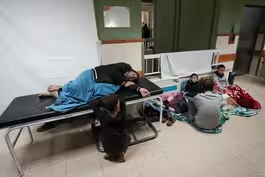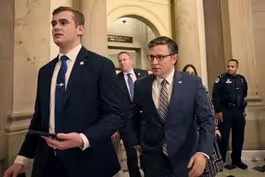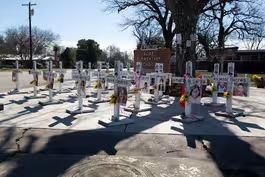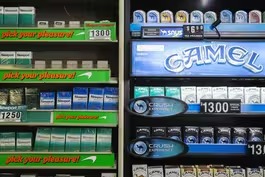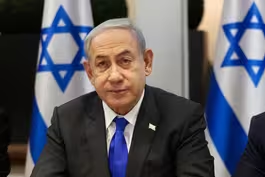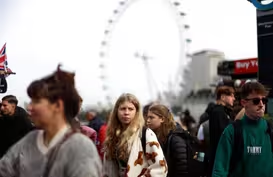
Michele Norris discusses new book 'Our Hidden Conversations'
Clip: 1/18/2024 | 7m 50sVideo has Closed Captions
Michele Norris discusses her new book on how Americans see race and identity
In 2010, journalist Michele Norris started “The Race Card Project.” She asked people around the world to send her a postcard, and in just six words, share their thoughts, questions, experiences and aspirations about identity and race. Geoff Bennett and Norris discussed the project and her new book, “Our Hidden Conversations: What Americans Really Think About Race and Identity.”
Problems playing video? | Closed Captioning Feedback
Problems playing video? | Closed Captioning Feedback
Major corporate funding for the PBS News Hour is provided by BDO, BNSF, Consumer Cellular, American Cruise Lines, and Raymond James. Funding for the PBS NewsHour Weekend is provided by...

Michele Norris discusses new book 'Our Hidden Conversations'
Clip: 1/18/2024 | 7m 50sVideo has Closed Captions
In 2010, journalist Michele Norris started “The Race Card Project.” She asked people around the world to send her a postcard, and in just six words, share their thoughts, questions, experiences and aspirations about identity and race. Geoff Bennett and Norris discussed the project and her new book, “Our Hidden Conversations: What Americans Really Think About Race and Identity.”
Problems playing video? | Closed Captioning Feedback
How to Watch PBS News Hour
PBS News Hour is available to stream on pbs.org and the free PBS App, available on iPhone, Apple TV, Android TV, Android smartphones, Amazon Fire TV, Amazon Fire Tablet, Roku, Samsung Smart TV, and Vizio.
Providing Support for PBS.org
Learn Moreabout PBS online sponsorshipwhere she asked people around the world to# send her a postcard, and, in just six words,## share their thoughts, questions, experiences,# and aspirations about identity and race.
The result was astonishing.
The# responses were vulnerable, honest,## and revealing.
And she compiled many of# the postcards into a new book called "Our## Hidden Conversations: What Americans# Really Think About Race and Identity."
And Michele Norris joins us now.
Welcome back to the "NewsHour.
MICHELE NORRIS, Au GEOFF BENNETT: The Race Card How have the submissions tracked this country's# racial journey over that same period of time?
MICHELE NORRIS: Well, when# we started this in 2010,## we were two years into the administration# of our nation's first Black president.
we were having a discussion as a country at# that time about America being post-racial.
So there was sort of a whoosh of hope in# the air.
And a lot of the submissions at## the beginning reflected that.
Only one race,# the human race.
Can't we just all get along?
But, over time, the cards got deeper, and# people started to share some of the things## that the viewers saw in the introduction.# The reason I ended a sweet relationship.
I'm## only Asian because it's convenient or when it's# convenient.
I'm white, not allowed to be proud.
And what we realized pretty quickly a# couple years into this is that it was## a little bit of a divining rod.
Like, you# could track things that were happening in## the news or in society.
They# would show up in the inbox.
So, Trayvon Martin, for instance,# the killing of Trayvon Martin,## that did not become national news for weeks# after he was killed in Florida.
We were starting## to see stories about people talking about an# America that no longer felt comfortable to them## or familiar to them in ways that we hear now,# for instance, at far right political rallies.
That language that has been almost normalized,## we were starting to see it early on in the inbox.# So, as a jou but it was a very useful tool for trying# to understand what was going on in America## outside of the headlines, what was going on# in really personal spaces in people's lives.
GEOFF BENNETT: Yes.
Conversa but this book breaks free of that.
It# reflects a real panorama of race, class,## age, background.
What stories stand out to# you?
And did you pick up any through lines,## any points of connection among people?
MICHELE NORRIS: There were certain# through tell a story.
It's actually the# name of a chapter in GEOFF BENNETT: Right.
sometimes saying the same thing.
We have hundreds of cards# from women you're pretty for a, fill in the blank,# you're pretty fo you're pretty for an Indian girl, or# something like that, written in six words.
And so you see that sometimes people# are all climbing the same hill,## struggling with the same things.
But the# other thing that's interesting to me,## Geoff, is that none of the cards reveal# patterns.
They reveal the way America# is sometimes in conversation with# itself without even knowing it.
GEOFF BENNETT: In what ways?
MICH someone writes in about mugged# by Black teens, trust destroyed.
You get cards that people are talking about their# fear of people of color.
And then you get cards## on the other side that fall into some version# of, lady, I don't want your purse.
You know,## and so a card that came in, I'm not# intimidating.
You are intimidated.
And so it's almost like a conversation that people# are having across difference, across some sort of## chasm.
And, sometimes, it happens in ways that,# did these two people just talk to each other?
MICHELE NORRIS: And then there are# cases where people actually aren't## talking to each other, but they're talking to me.
In the book, there are exam She's white.
He's Iranian.
They# send in cards to The Race Card## Project after listening to a segment on# National Public Radio.
They don't know## that they have each sent in the card.
But I# recognize she's talking about he MICHELE NORRIS: And, years later,# I interview the two of them,## and they're like, you sent in a GEOFF BENNETT: In the book, you co untry is so often seen as the default, or,# as you say in the book, the normative identity.
There are a number of submissions that fall# along these lines.
There's one card that says:## "Being white is not a crime.
It's OK to be white."
There's another card that says: "Do# hillbillies get white privilege to What do those submissions reveal?
MICHELE NORRIS: Or another Those submissions were surprising to# me, not the individual submissions,## the volume of them.
When I put the card on the# -- when I put the basket on the table and I ask## people to share their stories about race, most of# our conversations about race in America are by,## for or about people of color, and they fall# along that Black-white binary that you discussed.
But even when that happens, white Americans often# have a bit of a bystander status.
The conversation## is usually led by or targeted at people of# color.
When I put that basket on the table,## I never expected to engage in a# 14-year odyssey of listening to## white Americans talk about race.# That was completely surprising.
And in most of the 14 years that# we have been doing this work,## the majority of the cards have# come from white people in America.
MICHELE NORRIS: Or we also have# cards that come from more than## 100 countries.
The majority, though, fr And that was surprising and# revealing and rewarding,## as a journalist, because it helped# me understand America in a different## way.
These are conversations that# I normally don't have access to.
And, as you noted, in some of these cards,# there's a certain defensiveness sometimes.## There's a certain sense that this# conversation doesn't include me,## and when it does, I'm always# made out to be the bad guy.
GEOFF BENNETT: May I ask what your race card say MICHELE NORRIS: When I first started doing this,## my six words w MICHELE NORRIS: Because I am# a brown girl that grew up in a## Midwestern state.
I'm from Minnesota.# I had a speech impediment as a kid.
A life as a communicator was not imagined for# me, in part because of who I was and where I## came from and how I presented in the world.# And I didn't see a track for that.
Didn't## see.
There was no -- there were no Gwen# Ifills on the air when I was growing up.
Over time, my six words have changed.
And it's# in part as America has changed.
We're in a hurry## to get over this.
We want to be post-racial.# We want to see the finish line.
And I think## some form of debate will always be with us,# because we're just such a variegated country.
And so my six words now are:# "Still more work to be done."
GEOFF BENNETT: Michele Norris.
The book and the intention behi "Our Hidden Conversations: What Americans# Really Think About Race and we also have to credit Kadir Nelson# for this extraordinary cover art.
MICHELE NORRIS: Yes.
Yes.
It's really wonderful.
And the -- I w so there are lots of photos inside.
It's a# ve GEOFF BENNETT: Real privilege# to speak with you.
Thank you.
American doctor describes dire humanitarian crisis in Gaza
Video has Closed Captions
Clip: 1/18/2024 | 9m 10s | American doctor who worked in Gaza describes dire humanitarian crisis civilians there face (9m 10s)
Congress passes temporary funding bill to avert shutdown
Video has Closed Captions
Clip: 1/18/2024 | 5m 40s | Congress sends Biden temporary funding bill to avert government shutdown (5m 40s)
DOJ issues review of police response to Uvalde shooting
Video has Closed Captions
Clip: 1/18/2024 | 6m 31s | DOJ issues scathing review of failed police response to Uvalde school shooting (6m 31s)
Health advocates press White House to ban menthol cigarettes
Video has Closed Captions
Clip: 1/18/2024 | 7m 16s | How menthol cigarettes have disproportionately affected Black Americans (7m 16s)
News Wrap: Netanyahu opposes Palestinian statehood after war
Video has Closed Captions
Clip: 1/18/2024 | 4m 48s | News Wrap: Netanyahu tells U.S. he opposes Palestinian statehood after Gaza war (4m 48s)
Tourism industry responding to women drawn to solo travel
Video has Closed Captions
Clip: 1/18/2024 | 6m 30s | Why women are drawn to solo travel and how the tourism industry is responding (6m 30s)
What's in the bill to expand the child tax credit
Video has Closed Captions
Clip: 1/18/2024 | 4m 21s | What's in the bill to expand the child tax credit and how it can help struggling families (4m 21s)
Providing Support for PBS.org
Learn Moreabout PBS online sponsorship
- News and Public Affairs

FRONTLINE is investigative journalism that questions, explains and changes our world.

- News and Public Affairs

Amanpour and Company features conversations with leaders and decision makers.












Support for PBS provided by:
Major corporate funding for the PBS News Hour is provided by BDO, BNSF, Consumer Cellular, American Cruise Lines, and Raymond James. Funding for the PBS NewsHour Weekend is provided by...
